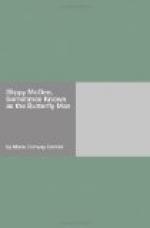But I was proud of him. His manner had a pleasant shyness, which was a tribute to the young girl’s beauty. It had as well a simple dignity. And one was impressed by the fine and powerful physique of him, so lean and springy, so boyishly slim about the hips and waist, so deeply stamped with clean living of days in the open, of nights under the stars. The features had thinned and sharpened, and his red beard became him; the hair thinning on the temples increased the breadth of the forehead, and behind his glasses the piercing blue eyes—something like an eagle’s eyes—were clear, direct, and kind. He wore his clothes well, with a sort of careless carefulness, more like an Englishman than an American, who is always welldressed, but rather gives the impression of being conscious of it.
Mary Virginia’s lips parted, her eyes widened, for a fraction of a second. But if, remembering him as she had first seen and known him, she was astonished to find him as he was now, she gave no further outward sign. Instead, she gave him her hand as to an equal, and in a few gracious words let him know that she knew and was proud of what he had done and what he was yet to do. She repeated, too, with a pretty air of personal triumph, the old nobleman’s praise. Indeed, it had been he who had told her of the book, which he had lately purchased and studied, she said. And oh, hadn’t she just swelled with pride! She had been that conceited!
“You don’t know how much obliged to you I should be, for if he hadn’t accidentally learned I was from Appleboro, the town in which dwelt his most greatly prized correspondent—that’s what he said, Mr. Flint!—why, I’m sure he wouldn’t have noticed me any more than he noticed any other girl—which is, not at all; he being a toplofty and serious Personage addicted to people who do things and write things, particularly things about things that crawl and fly. And if he hadn’t noticed me so pointedly—he actually came to see us!—why, I shouldn’t have had such a perfectly gorgeous time. It was a great feather in my cap,” she crowed. “Everybody envied me desperately!” She managed to make us understand that this was really a compliment to the Butterfly Man, not to herself.
“If the little book served you for one minute it was well worth the four years it took me to gather the materials together and write it,” said he, pleasantly. And even the courtly Hunter couldn’t have said it with a manlier grace.
“Mary Virginia,” said Laurence slyly, “when you’ve had your fill of bugs, make him show you the Book of Obituaries. He thereby stands revealed in his true colors. Why, he made me buy the old Clarion and hire Jim Dabney to run it, so his supply of mortuary gems shouldn’t be cut off untimely. To-day he culled this one:
Phileola dear, we cry because
thou hast gone and left us,
But well we know it is a merciful
heaven which has bereft us.
We tried five doctors and
everything else we knew of you to save,
But alas, nothing did you
any good, and to-day you are in your grave!




